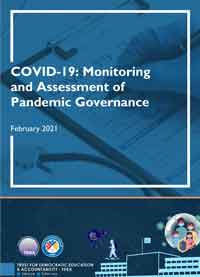- Transparency is critical to successful vaccination drive
ISLAMABAD, February 3, 2021: Free and Fair Election Network (FAFEN) has demanded parliamentary oversight of COVID-19 response as it is critical for bringing transparency to a successful vaccination drive.
In its third monthly COVID-19 response monitoring report, FAFEN observed decline in the total number of active cases by 15,007, despite December being the deadliest month for Pakistan as the country witnessed 2,010 more deaths due to COVID-19.
Based on the findings from data collected through stakeholders’ surveys and direct observation of enumerators deployed in 34 project districts, the report highlights the challenges and opportunities at hand as the government heads towards the daunting task of procurement and the administration of the COVID-19 vaccine.
This monitoring report identifies regulation of COVID-19 testing and effective disbursement and administration of vaccination as two priority areas for better governance of the pandemic response in Pakistan. Findings also indicate continuing health-governance challenges at both policy and implementation levels that remain mostly unaddressed with the potential to worsen the healthcare crisis in the country.
Some of the significant findings are:
- COVID-19 testing came out as one of the weakest areas requiring immediate and close government attention. At present, Pakistan has the lowest per capita testing capacity in the region. In December, the country conducted 1.2 million tests. Comparing this data with the number of deaths shows that the response has failed to keep pace with the increase in cases. Such grave shortcomings in response management are both the cause and effect of lapses in the overall pandemic governance. For instance, the lack of effective regulation of testing prices can be seen as a cause of the relatively smaller number of tests that harms the overall pandemic response itself.
- The chronic lack of legislative oversight of the COVID-19 response did not improve in December as both houses of parliament paid next to no attention to the COVID-19 response. The elected representatives’ persistent lack of seriousness has affected the ongoing response’s quality and the upcoming task of COVID-19 vaccination.
- With COVID-19 vaccine procurement being in its initial stages, questions of accountability, transparency, and participatory decision-making remain unanswered at all policy and decision-making levels. Considering this being one of the largest health-related procurement in Pakistan’s history, the government needs to have transparent and interactive communication about the vaccine’s selection and disbursement. Failure to do so makes the procurement process dubious and may also affect the credibility and acceptance of vaccines among the masses.
- The lack of public trust and seriousness is already hindering the effort to implement SOPs. A similar public attitude towards vaccination is bound to compound the pandemics’ impact on the community. The report, through direct observation, found:
- Lack of unanimity among various vital stakeholders on SOPs implementation in 18 (51 percent) districts and an absence of coordination among different stakeholders. Such lack of coordination also existed at the infrastructural level, where there are varying opinions of the healthcare professionals and district management on the availability of PPEs. Similarly, whereas the interviewed government officials reported sufficient healthcare infrastructure like PPEs in place, most representatives of doctors’ and paramedics’ associations only partially endorsed the statement.
- Technical capacity to deal with COVID-19 stays an area where the government needs to invest resources in terms of the numbers and skillset of healthcare providers. Although the number of paramedics’ deaths declined, doctors remain at risk and have expressed the need to undergo training on COVID-19, patient management, and personal protection. According to the healthcare professionals, the specific training areas include knowledge about the disease, use of medical and personal protective equipment, testing, and patient management.
- SOPs implementation remains an issue that demands attention. Observation of public offices and health facilities points towards the fact that wearing masks and maintaining social distancing are the two major, yet crucial, SOPs not followed by the public.
- A clear and consistent communication strategy is lacking at both the regional and national levels leading to haphazard compliance in public areas, offices, and even health facilities.
- As Pakistan gears to enter the vaccination phase—the most significant step in its COVID-19 response in the coming days—the importance of transparency and information-sharing will become critical to public trust in the exercise’s efficacy. Transparency in all aspects of vaccine selection, procurement, priority groups, and smooth implementation will only be possible with enhanced oversight and ownership of elected bodies and representatives, a requirement that has remained seriously deficient in the COVID-19 response to date.
To download Urdu Press Release, click here | To download the complete report, click here


